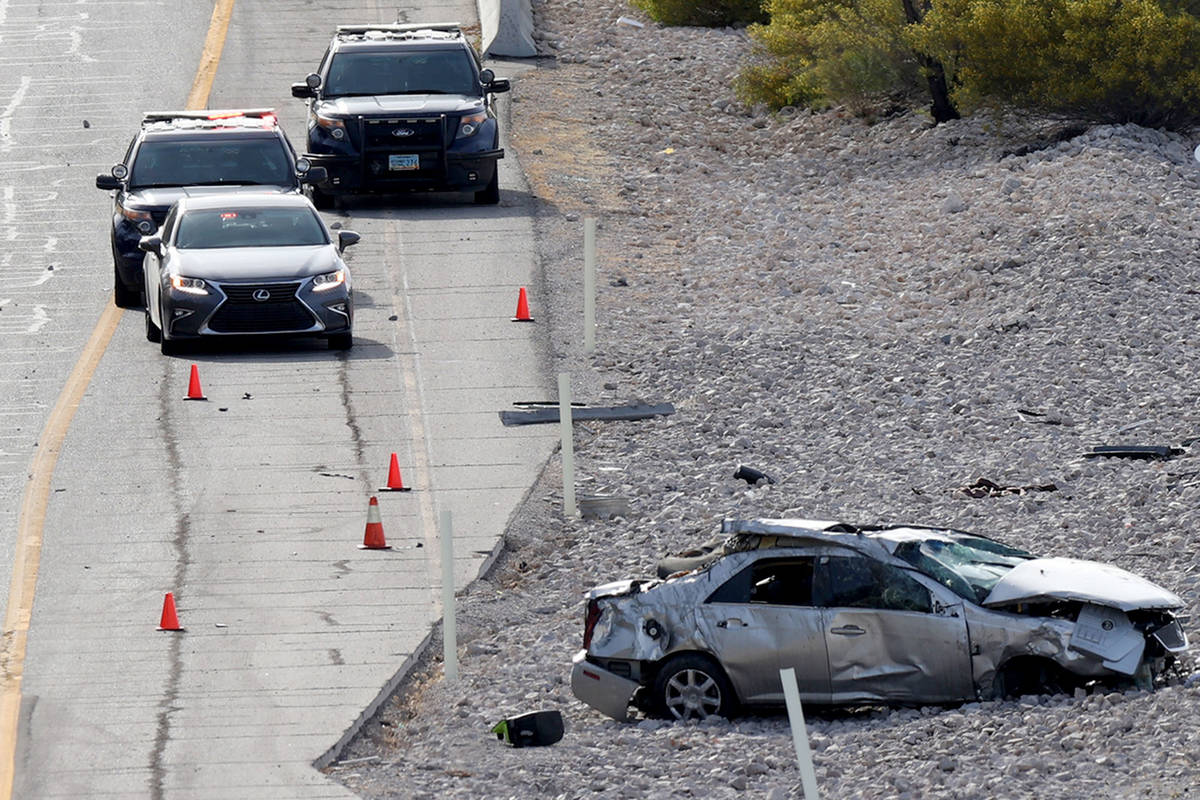Fatal crashes down sharply in Nevada during COVID-19 closures

There have been fewer fatal accidents in Nevada since the start of the coronavirus pandemic, during which stay-at-home orders have resulted in less traffic on the valley’s roadways, according to state data released Thursday.
Although the pandemic didn’t hit the state until March 5, when the first COVID-19 case was announced, the decrease in both fatal crashes and overall fatalities was more significant in March than in April.
According to data from the Office of Traffic Safety, fatal crashes in Nevada decreased by about 39 percent in March compared to March 2019. In contrast, the year-over-year decrease was about 9 percent in April.
Office of Traffic Safety spokesman Andrew Bennett said Thursday fewer crashes would have been expected in April as the volume of traffic on state roadswere lower throughout the entire month.Instead the number of crashes and total fatalities “dramatically went down a lot more (in March) than they did in April,” he said.
The state recorded 23 fatal crashes in March 2019, which killed 23 people. This year, the monthly totals were 14 crashes and 14 fatalities, according to the report.
Total crashes decreased slightly statewide in April — from 24 to 23 — compared to April of last year, but produced one more death, 24 vs. 23, according to the report.
Speeding may play a factor
The report didn’t track factors in fatalities such as speed or drunken driving, but Bennett said that based on his own observations, speed has contributed to up to half of recent fatal crashes, compared to about one-third during normal times.
Nearly empty roads likely played a role in that, he said.
“With the decreased traffic volume there’s more opportunity to speed, and speed has definitely become more prevalent in fatalities recently,” Bennett said.
The Nevada Highway Patrol tweeted this week that the last four fatal crashes investigated by the agency were “speed related.” The Metropolitan Police Department has also taken to Twitter during the pandemic to warn the public about speeding drivers, and the Boulder City Police Department on Wednesday released a statement saying its officers have seen an increase in speeding during the coronavirus crisis.
Bennett said reducing speeding, drunken driving and increasing the use of seat belts would have the biggest impact in reducing fatal crashes.
A Review-Journal analysis of arrest information from the Clark County Detention Center showed that while fewer people were booked into the jail on suspicion of DUI during the pandemic, the downturn wasn’t nearly as dramatic as the decline in fatal crashes or for crashes in general.
According to the Metro data, the number of crashes investigated by the department in March decreased by 27 percent from March 2019, and decreased by about 55 percent in April compared to the same month last year.
Because of the reduced traffic volume and reduction in insurance claims, the Nevada Division of Insurance announced last week it had approved requests from insurance companies to give out refund credits, checks, dividends or take “similar measures” during the pandemic shutdown.
Travelers, Geico, State Farm and Progressive are some of the major insurance companies offering reduced premiums, flexible payment options and other programs because of the reduction in claims.
County fatal crashes
Fatal crash statistics for Clark County reflect the downward trend in the state.
There have been a total of 50 fatal crashes this year in the county that left 53 people dead, according to the report. At this time last year, there were 60 fatal crashes and 61 fatalities.
That represents a 17 percent decrease in fatal crashes compared to the first four months of 2019, and about a 13 percent decrease in fatalities.
Percentage changes can appear dramatic when there are relatively few crashes to report on, such as fatal motorcycle crashes in Lyon County increasing by 100 percent through April compared to 2019, when the county saw no such crashes.
Bennett said it’s normal to see data vary “month over month,” but recent changes appear to be influenced by the coronavirus pandemic.
“I think this one’s a little bit more easy to explain then some of the years past,” he said.
Contact Katelyn Newberg at knewberg@reviewjournal.com or 702-383-0240. Follow @k_newberg on Twitter.